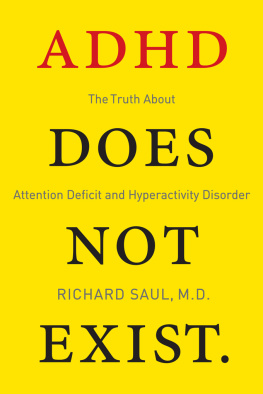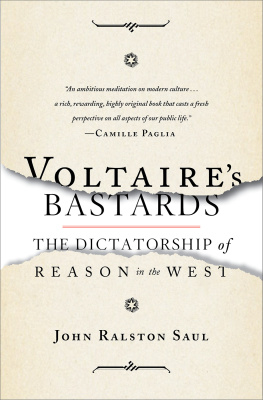International Acclaim forOn Equilibrium
With On Equilibrium John Ralston Saul convincingly stakes his claim for a place in the great philosophical continuum by contributing his own perspective to the key questions: What is a good life? What constitutes a good society? That Sauls answers are ultimately fraught with doubt, uncertainty and paradox is deliberate, and intrinsic to Sauls model for human fulfilment. It is a complex, paradigm-shifting model. Quill and Quire
The six distinctive qualities that make us human. Think of them as the cylinders driving the engine of human nature. Or, perhaps more appropriately, think of them as potions swirling around in a kind of uneasy chemical balance. You can focus on them in isolation, but they work together and thats how we need to appreciate and use them. The Hamilton Spectator
He provides tools people can use to shake their passivity and start taking responsibility for whats going on around them. Vancouver Sun
On Equilibrium is a. description of how civilizations can best function and how societies are best nurtured. In Canada, there has not been a better or more challenging overview of these far-reaching ideas. His intellectual take on each of the six qualities is almost breathtaking in its self-confident quirkiness. A triumph and a pleasure. Shards of brilliance and crystalline insights on almost every page. Montreal Gazette
Over the past decade John Ralston Saul has brought a stimulating new vision to understanding the place of the common citizen in western civilization. It is only appropriate that he should offer up a sequel to this trilogy that might empower us or perhaps identify a few tools we could use to do something about the state of the world. Imagination, reason, memory, intuition, ethics and common sense. On Equilibrium. seeks to fill out a new mind set around those six words. As with the trilogy, Saul shows his gift for bringing a fresh perspective to concepts weve come to take for granted, for unmasking absurdity and explaining the paradoxical. Even if you dont agree with everything he says, its hard to ignore the sense that Saul is one of the great fluid thinkers around. Edmonton Journal
Only in a book by John Ralston Saul could you find such an intriguing array of ideas, and more. Saul is a true intellectual maverick, one who revels in his role as an iconoclast and provocateur. His latest book, On Equilibrium, is his most wide-ranging work since Voltaires Bastards. And like Voltaires Bastards, it is almost impossible to categorise: is it a neo-classical humanist treatise; a philosophical exploration or a critique of contemporary society? Whatever the answer, his project is to identify the patterns of dysfunction underlying human civilisation, including its historical and intellectual origins and its present social, cultural and political manifestations. HQ Reviews Books
It is not the habit of John Ralston Saul to ask small questions or to make the answers easy. Like Orwell, Koestler, Marshall McLuhan, Primo Levi and Tim Flannery he tells us unsparingly how tremendously we got things wrong, how much magic the Age of Reason cost us. In On Equilibrium he tells us, or attempts to tell us, what to do now. Warming to his task, which is nothing less than the composition of a post-religious Koran for thoughtful humankind, he roves through military strategy, Renaissance art, Guatemalan fiction, the French Underground, Greek tragedy, animism, Picasso, ethology, Cervantes, ice hockey, Platos ongoing war on his mentor Socrates and mad cow disease in quest of the total jigsaw that makes us what we are, and were, and could be. Its hard, though, to summarise even a paragraph of this omnivorous, persuasive, many-tentacled book, which is in itself a concentrated summary (easy to read for a page or so, but necessary to put down and resonate with for an hour or two thereafter) of what we now might guess is the shape and scope of things as they are in our universe, and in our tribal memory, and why our present rulers so hate our creativity, our intuition, our sense of right and wrong and need to erase them from the vocabulary of dissent. But given that this, and not Finnegans Wake, is one of the books that we should read and re-read for the rest of our lives and (let me put it precisely) among the most important, absorbing and fulfilling books of our time, he deserves a little self-congratulation, however demurely he seeks it, as the most wide-ranging mind, and one of the greatest organising and focusing teachers we have. The Sydney Morning Herald (Australia)
How conscious are we willing to be of our humanness? This is one of the central issues of John Ralston Sauls new work, which follows on from his highly acclaimed and influential philosophical trilogy Voltaires Bastards, The Doubters Companion and The Unconscious Civilisation. As with these works, On Equilibrium is certainly not light reading, but it is a deeply rewarding mental workout, and the passion, courage and optimism that he brings to his work and expresses so fluently is nothing if not inspirational. Ralston Saul is as ruthless as ever in his criticism of the status quo, yet he is far from negative. A writer of prodigious intellect and breadth of knowledge, his humour and irony are never far below the surface. I enjoyed the way that the structure of this book seems to subtly mock the innumerable works of self-help literature that, along with sport and romance, serve in his view to palliate an increasingly self-focused and disoriented citizenry. Each chapter is a fascinating and erudite exploration of one of these qualities, displaying all of Ralston Sauls mastery of insight and historical detail, and reading as a powerful exhortation towards engagement with society and the democratic process for all. Completed in September 2001, the timing of this publication is interesting in itself: Ralston Saul has a great deal to offer the myriad debates that have arisen after the destruction of the World Trade Center and the immediate and consequent tragedies thereof. At the same time, he offers us an example of philosophical and political criticism at its most humane. The New Zealand Herald
PENGUIN CANADA
ON EQUILIBRIUM
John Ralston Sauls philosophical trilogyVoltaires Bastards: The Dictatorship of Reason in the West, The Doubters Companion: A Dictionary of Aggressive Common Sense and The Unconscious Civilizationhas had a growing impact on political thought in many countries. The Unconscious Civilization won the 1996 Governor Generals Literary Award for Non-Fiction, as well as the Gordon Montador Award for Best Canadian Book on Social Issues.
Mr. Sauls ideas on the nature of Canada were presented in Reflections of a Siamese Twin, which also won a Montador Award and was chosen by Macleans magazine as one of the ten best non-fiction books of the twentieth century. He is the founder of the LaFontaine-Baldwin Lectures, the first three of which are collected in The LaFontaine-Baldwin Lectures: A Dialogue on Democracy in Canada.
He is also the author of five novels, which deal with the crisis of modern power and its clash with the individual. His most recent novel, The Paradise Eater, won the Premio Lettarario Internazionale in Italy. Like his non-fiction, his novels have been translated into many languages.
John Ralston Saul was born in Ottawa and studied at McGill University and the University of London, where he obtained his Ph.D. in 1972.
Also by John Ralston Saul
NOVELS
The Birds of Prey
The Field Trilogy:
I. Baraka or The Lives, Fortunes,
and Sacred Honor of Anthony Smith
II. The Next Best Thing
III. The Paradise Eater
De si bons Amricains
ESSAYS
Voltaires Bastards
Next page










